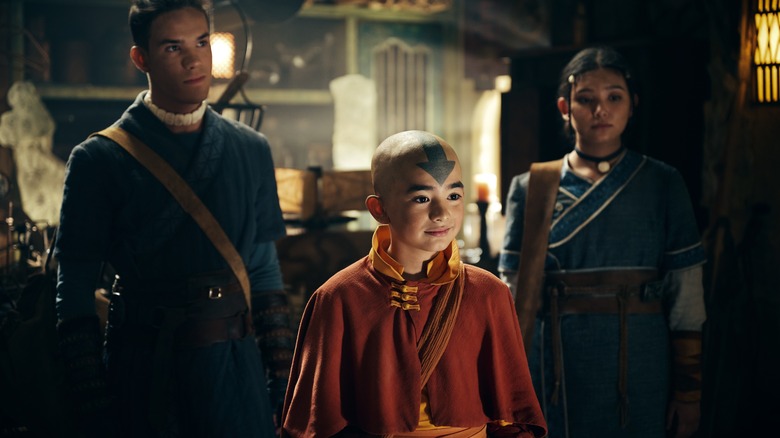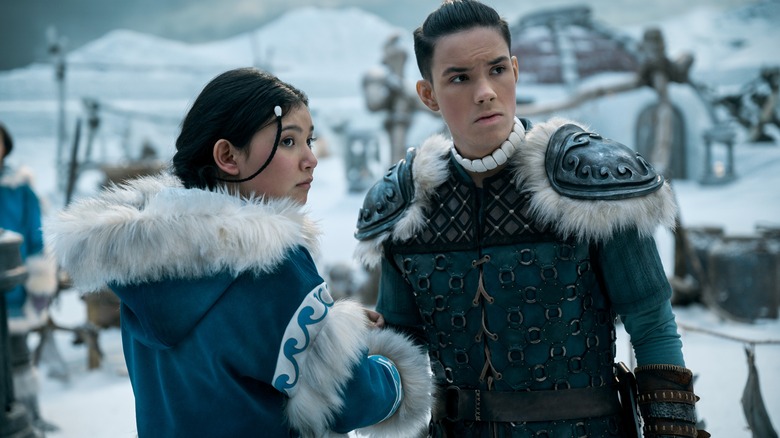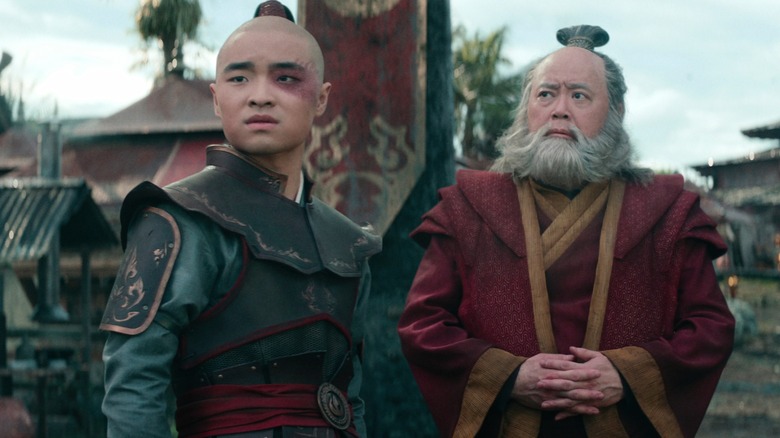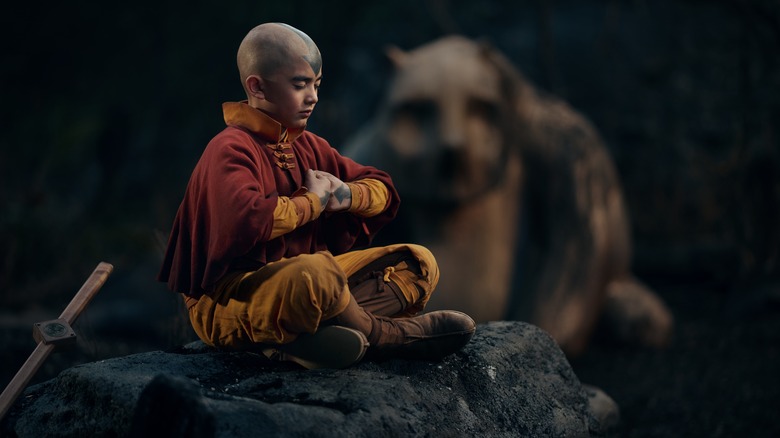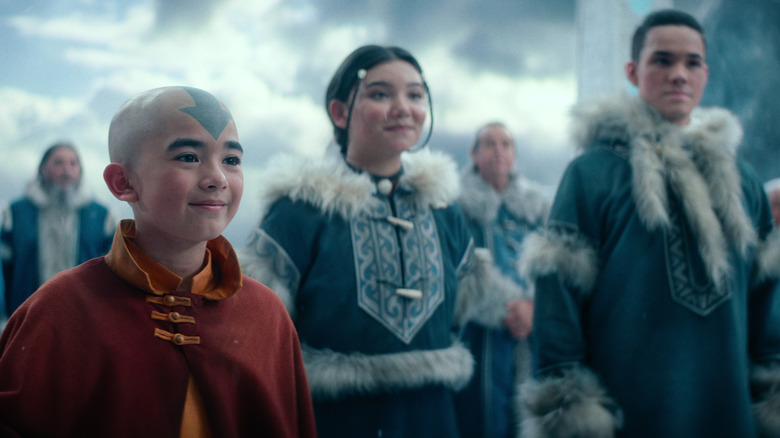Avatar: The Last Airbender Season 1 Ending Explained: It's All About Friendship
This post contains spoilers for "Avatar: The Last Airbender."
Can we get a yip-yip? After quite a long wait, the celebrated children's series "Avatar: The Last Airbender" has taken the massive leap from animation to live-action. Although mileage may vary on exactly how well Netflix pulled off this ambitious feat of adaptation, the characters that fans have known and loved have all been reimagined through the lens of a much more streamlined and straightforward version of the same story.
The debut season follows Aang (Gordon Cormier), the reincarnated Avatar and master of the four elements, as he struggles to come to grips with his disappearance from the world a hundred years prior. The stunning opening sequence of the premiere depicts this very event in all its tragic detail, beginning with Aang's reveal that he is the long-prophesied savior of the world and continuing through to the conquering Fire Nation's genocide of the airbenders. After that shocking addition to the lore, however, the plot settles into a much more familiar — if truncated — spin on the original. After meeting Water Tribe friends Sokka (Ian Ousley) and his waterbending sister Katara (Kiawentiio), the main thrust of the story comes into focus with the arrival of the villainous young Fire Nation heir Prince Zuko (Dallas Liu). From there, the season unfolds in something of a cat-and-mouse chase between the two rivals ... who just might share more in common than they realize in the early going.
The story is familiar and beloved to any longtime fan of the animated show, but the Netflix series (led by writer/executive producer Albert Kim) takes certain significant creative liberties and puts its own twist on the way towards the epic finale. Let's break it all down.
What you need to remember about the plot of Avatar: The Last Airbender
Just like any reinterpretations of beloved stories, there are changes from what fans experienced the first time around. As an eight-episode Netflix series, "The Last Airbender" covers most of the major milestones of the first season (referred to as "Book One: Water" in the original) while mostly cutting out the more episodic adventures. Sadly, that means there's not enough time to go sledding with otter penguins, play airball at the Southern Air Temple, or tangle with the eel-like monster Unagi at Kyoshi Island. Instead, we get a much more serialized narrative that takes our fan-favorite characters from point A to point B in very direct fashion.
After inadvertently leading Zuko, his loyal Uncle Iron (Paul Sun-Hyung Lee), and their ragtag crew to the shores of Wolf Cove in the south pole in the premiere, Aang bravely sacrifices his own freedom to lead Zuko away and spare the Water Tribe of any further tragedy. But his newfound friends aren't so easily deterred, as Sokka and Katara (and the lovable flying bison Appa) save him from Zuko's clutches and promptly head out into the world — not necessarily with the goal of finding a master of waterbending for Katara and Aang, as the original series does, but to help Aang however they can. That takes them to the Southern Air Temple we first saw in the extensive prologue sequence, where the issue of Aang's Avatar State and his need to control this destructive force first comes up and motivates the rest of his journey to Kyoshi Island, the Earthbending city of Omashu (where several storylines from the animated series have been combined), the Spirit World, and finally the Northern Water Tribe located at the north pole.
What happened at the end of Avatar: The Last Airbender?
Throughout the season, Aang's adventures keep him barely one step ahead of the advancing Fire Nation forces, all of whom are dead-set on capturing the Avatar and ensuring the outcome of their century-long war of conquest. Not only are Zuko and Iroh hot on their heels, but their encounter with a newly-reinvented Commander Zhao (Ken Leung) results in the unlikely officer enlisting in the hunt for his own reasons of personal ambition and power. Over all of this hangs the shadows of Fire Lord Ozai (Daniel Dae Kim) and his daughter Azula (Elizabeth Yu), both of whom keep an eye on these developments from afar in the Fire Nation.
With every stop that Team Avatar makes, however, their enemies only grow closer and closer to achieving their goals. By the time Aang receives his vision of the future from the past Avatar Kyoshi (Yvonne Chapman), revealing an impending tragedy in the north that he must prevent at all costs, the season's endpoint has rounded into form. After many trials and skirmishes with Zuko and his allies, Aang, Katara, and Sokka finally make it to the safety of the Northern Water Tribe ... only to realize that they've once again brought the full might of the Fire Nation to their doorstep. After an entire episode spent preparing for the battle — including Aang's ongoing consultation with the past Avatars, Sokka's romance with the mystical Princess Tue (Amber Midthunder), and Katara's efforts to get a reluctant master to allow her combat training in waterbending (A Martinez as the curmudgeonly Pakku) — the finale clears the deck for the legendary Siege of the North.
The burden of the Avatar
Throughout every one of Aang's otherworldly conversations with his past Avatar lives, one lesson is drilled into his head again and again: To become who he was (re)born to be, he must go it alone. The burden of responsibility belongs to nobody but himself. For a young boy who, like Zuko, had his childhood stripped from him long before it ever should've been, that's a lot to live up to. And, to no surprise, this crushing weight of pressure has adverse effects on the Avatar.
It isn't long before Zhao's overwhelming navy arrives and promptly lays siege to the Northern Water Tribe city of Agna Qel'a. Little do they know, however, that Zhao's sinister plan involves murdering the Moon Spirit residing at the center of the city, thus depriving the waterbenders of their powers and, subsequently, any hope of survival. Meanwhile, Zuko (presumed dead after an assassination attempt by Zhao) sneaks into the city in order to recover Aang for himself, bring him back home to the Fire Nation, and restore his honor in the eyes of his father, Ozai. All these storylines come to a head in the midst of the epic battle between fire and water, culminating in Zhao messing with the natural order and seemingly turning the tide of battle in his favor.
But in the ultimate thematic rebuttal of everything Aang has been taught, only the intervention of his friends helps save the day. Yue, imbued from childhood with the power of the Moon Spirit, takes its place in the ultimate form of self-sacrifice. Aang, who channels the rage of the Ocean Spirit, is saved from destruction by Katara's sincerity. Even Sokka learns that being a hero means more than being a warrior, bringing everyone's arcs to a satisfying close.
Looking ahead
By the end, the explosive finale of "Avatar: The Last Airbender" more or less brings the Netflix series in line with the original. With Zhao and his forces defeated, Zuko and Uncle Iroh escape the rout and regroup for the time being — a humbled Zuko in particular having learned the harsh lesson that there's more to life than his reputation back home. Aided by the help of his friends, Aang finally accepts that he can let go of his past and all the mistakes he made. That proves to be the only way he can focus what needs to be done in the future. This moment of introspection comes none too soon, however, as we realize that Fire Lord Ozai has finally let Azula let off her leash and, together, the Fire Nation is poised to cause all sorts of trouble moving forward.
There's no guarantee that the live-action series will actually receive a second season at this point, mind you, but all the pieces are in place for a fairly faithful adaptation of the original's "Book 2: Earth." As evidenced by Azula's inclusion, "The Last Airbender" actually took quite a few elements (pun most definitely intended) from future storylines and repurposed them for this debut season. Although viewers may be split on exactly how effective these changes turned out to be, there's no denying that a theoretical season 2 would be in prime position to hit the ground running and improve on the foundation laid down here. But that's a future that not even the Avatar can foresee just yet.
All eight episodes of "Avatar: The Last Airbender" season 1 are available to stream on Netflix.
